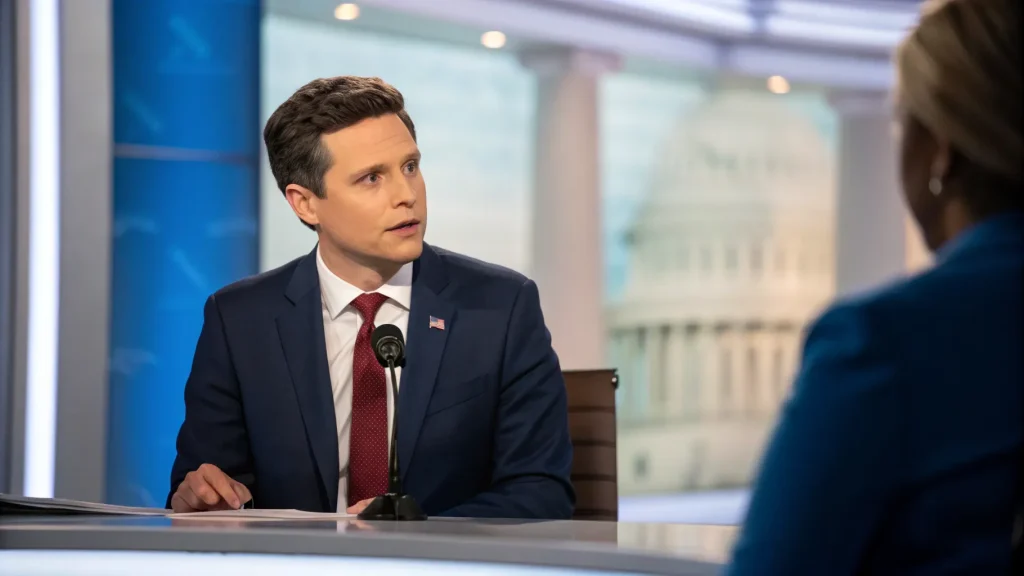On national television, Rep. Riley Moore, R-W.Va., faced pointed questions about what his party gained by agreeing to reopen the federal government after a standoff over funding. The exchange, aired on Fox Business’ Varney & Co., came as Congress moved to avoid deeper disruption. Viewers heard the core dispute: who got what, and whether the fight was worth it.
The conversation landed at a tense moment in Washington. Agencies had braced for a shutdown, and workers worried about missed paychecks. Republicans agreed to end the impasse, but critics argued the deal lacked clear wins. Moore defended the decision while acknowledging the stakes for his party and for taxpayers.
Table of Contents
ToggleWhat Sparked The Clash
Funding fights have become a regular feature of recent Congresses. Short-term measures keep the government open while leaders negotiate the bigger bills. In this latest round, hardliners pressed for deeper spending restraints and policy changes. Moderates warned that a shutdown would hurt families, businesses, and federal services.
Moore, a freshman Republican from West Virginia, walked into that tension. He carried both fiscal concerns and the realities of governing. The question he faced was simple but sharp: did Republicans secure results that match the risk?
The Tough Question On Air
“What did Republicans achieve in exchange for reopening the government?”
That challenge framed the interview. It captured a worry inside conservative circles: that repeated brinkmanship yields little leverage. It also reflected pressure from voters who want lower spending but dislike shutdown chaos.
Moore pushed back on the idea that the move was a retreat. He argued the step prevented harm to federal workers and allowed time for negotiations on long-term bills. He suggested accountability would come in the appropriations process, where line-by-line decisions get made.
Competing Claims Over Results
Conservatives claim the standoff spotlighted spending and border concerns. They say attention alone can shape the next round of talks. Critics counter that attention is not the same as outcomes. They want specific cuts or policy changes written into law.
- Supporters of the deal say it averts immediate damage and preserves bargaining power.
- Opponents argue the party traded leverage for a short reprieve.
Moore tried to thread that needle. He emphasized keeping services running for his constituents while insisting fiscal restraint remains the goal. He hinted that the proof would be in upcoming votes on full-year spending bills.
Why The Debate Matters
Shutdowns ripple across the economy. Federal employees miss pay. Contractors see delays. Small towns near federal facilities feel the squeeze quickly. In West Virginia, where federal programs and energy-related oversight are significant, disruptions pose real risks.
Political costs can be steep, too. Prolonged standoffs often turn into blame contests. Both parties know voters punish dysfunction. That is why leaders tend to seek off-ramps, even if the exit offers few clear victories.
What Comes Next In Congress
The next chapter will be the appropriations process. That is where lawmakers can pursue targeted cuts, agency reforms, and oversight language. If Republicans secure measurable changes, Moore’s defense of the deal will look stronger. If not, the criticism from the right will grow louder.
Expect negotiations to focus on a few areas: overall spending levels, border enforcement, and how to handle emergency funding. Leadership will try to avoid another shutdown deadline that invites public backlash.
The Stakes For Moore And The GOP
For a new member like Moore, the interview was a stress test. He must show he can press for conservative goals while keeping the government open. It is a balance many House Republicans must strike in a narrowly divided chamber.
Success will be measured in tangible outcomes. That means clearer numbers in final bills, visible oversight wins, and fewer last-minute crises. Without that, the question posed on air will return.
Moore and his colleagues bought time. Now they must show results. If upcoming spending bills deliver visible savings or policy changes, Republicans can claim the trade was smart. If not, voters may see the reopening as a reset without reward—and lawmakers will face the same question again, only louder.
















